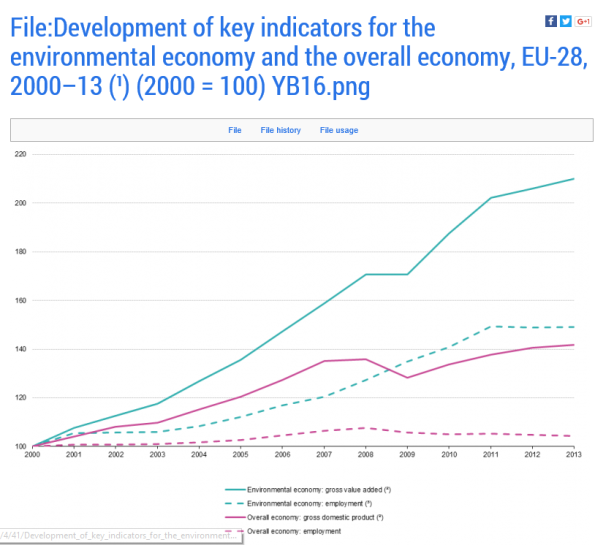Branko Milanovic gets philosophical about productive and unproductive labour. Is a dentist productive? A soldier? A lobbyist? Seen from the angle of national accounting such questions, important as they are, are beside the point as these accounts aim to gauge total income and all labour which yields an income (wages, profits, whatever) is considered to be productive. As it enables people to gain an income… People work for the money, even when they are protecting the environment. Which does not mean that the composition of production is not important. Of course it is. And according to Eurostat more and more people work to prevent even more environmental degradation (graph). Think: solar cells, wasste water treatment and comparable activities. This adds to GDP and income. And to a better (or at least: less bad) environment. The point: we are measuring this, using the national accounts (among other statistics). Which is a good thing.
Topics:
Merijn T. Knibbe considers the following as important: Uncategorized
This could be interesting, too:
tom writes The Ukraine war and Europe’s deepening march of folly
Stavros Mavroudeas writes CfP of Marxist Macroeconomic Modelling workgroup – 18th WAPE Forum, Istanbul August 6-8, 2025
Lars Pålsson Syll writes The pretence-of-knowledge syndrome
Dean Baker writes Crypto and Donald Trump’s strategic baseball card reserve

Branko Milanovic gets philosophical about productive and unproductive labour. Is a dentist productive? A soldier? A lobbyist? Seen from the angle of national accounting such questions, important as they are, are beside the point as these accounts aim to gauge total income and all labour which yields an income (wages, profits, whatever) is considered to be productive. As it enables people to gain an income… People work for the money, even when they are protecting the environment. Which does not mean that the composition of production is not important. Of course it is. And according to Eurostat more and more people work to prevent even more environmental degradation (graph). Think: solar cells, wasste water treatment and comparable activities. This adds to GDP and income. And to a better (or at least: less bad) environment. The point: we are measuring this, using the national accounts (among other statistics). Which is a good thing. Aside: Eurostat defines these activities as:
“The environmental goods and services account comprises two broad groups of activities and products:
- environmental protection — activities whose primary purpose is the prevention, reduction and elimination of pollution and any other degradation of the environment;
- resource management — activities whose primary purpose is preserving and maintaining the stock of natural resources and hence safeguarding against depletion.
Specialised classifications exist for environmental protection activities (CEPA) and resource management activities (CReMA).”
